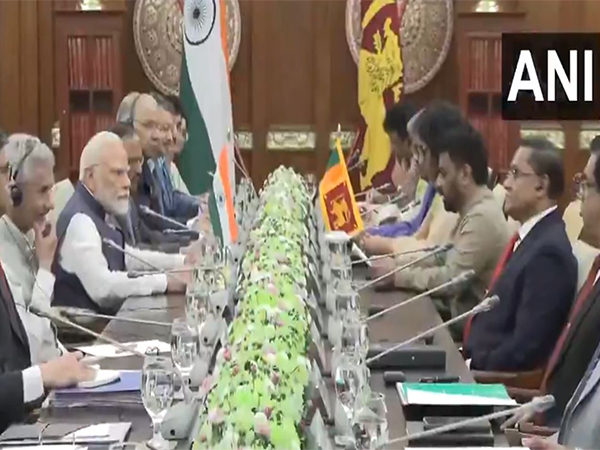Would India benefit from businesses relocating from Myanmar?
Mar 01, 2021

By Lee Kah Whye
Singapore, March 1 : When Myanmar's military seized power after detaining Aung San Suu Kyi and other democratically elected leaders in the early hours of February 1, they would have anticipated a civilian uprising, international condemnation and likely trade and financial sanctions.
They probably calculated that such a move, as has happened in the past, will result in initial months of unrest and international tension which would gradually subside into the background as other more important global events take over the attention of the international community.
What could be different this time is that the people of Myanmar, after having tasted relative freedom from military rule since 2010, could feel they have more at stake compared with 1990 when the military last invalidated the result of a general election.
Since 2010, when a partially free election was held - Aung San Suu Kyi's National League for Democracy (NLD) party was not allowed to take part, Myanmar has benefited from the measured lifting of economic sanctions resulting in its gradual integration into the global trading system and increased international investments. GDP grew more than 75 per cent from USD 49.5 billion in 2010, in constant 2010 US dollar terms, to USD 86.9 billion in 2019 (based on data from the World Bank).
Visitors who have been to its largest and main business city of Yangon pre-2010 and again in recent years would have noticed that it is now more bustling, with the streets are more crowded, and traffic jams caused by the proliferation of motor vehicles. The overt commercialism with numerous flashy billboards advertising Japanese and Korean consumer brands attests to the growing wealth of residents in the city and how they have benefited from the democratisation process.
The military's decision to grab power on the pretext of a "fraudulent" election will certainly stunt the economic growth of this so-called Asian economic frontier nation of 55 million.
Already companies who have been doing business and investing in Myanmar in recent years have been shaken by the latest development and are considering pulling out or are in the process of doing so.
With civil unrest and protests ongoing, there is a prevailing threat of violence. Foreign companies would be concerned about the safety of their staff and working conditions. Furthermore, the expected imposition of trade and financial sanctions will impact the ability of companies to operate in view of rising costs, reliability and sustainability of supply chains, the ability to export as well as financial transaction restrictions.
Even if the military does hold elections in one year's time as promised, instability and uncertainty will remain an issue for foreign investors. Myanmar was already struggling with problems associated with its years of international isolation and was facing issues like obtaining international financing, transparency, and corruption.
Singapore companies are by the far the largest foreign investors in Myanmar. Based on data from Myanmar'sMinistry of Investment and Foreign Economic Relations (MIFER) published in January, from 2016/17 to January 2021, the approved amount invested by Singapore companies stood at USD 11.4 billion. China, Hong Kong SAR, Vietnam and Japan are the next largest investors with USD 3.5 billion, USD 2.5 billion, USD1.5 billion and USD 1.3 billion approved amounts respectively.
Already Japan beer giant Kirin has announced that it is pulling out of a joint venture (JV) with Myanmar Economic Holdings Limited (MEHL), a company which is linked to its military leader. Singapore gaming company and PC maker Razer co-founder Lim Kaling said that he will abandon his stake in a JV in that country. At the same time, Thailand property developer Amata said it had suspended work on a large project in Yangon.
Myanmar's foreign investments and exports are limited mainly to garments, agriculture, real estate and light manufacturing. Cambodia, Laos, Vietnam, Bangladesh and India are countries that are most attractive for companies relocating their Myanmar businesses.
Moving the business to an ASEAN country would make sense since Myanmar is a member of the free trade block especially if the sources of supplies and market for the products are within the zone. Supplies and exports are virtually tax-free when moving within ASEAN. Cambodia, Laos and Vietnam are members of ASEAN that have similar industries with Myanmar. ASEAN also has free trade agreements with China, and India, with both having recently been amended to provide improved market access.
Cambodia, Vietnam and Bangladesh would be natural choices for apparel manufacturers.
Cambodia has some competitive advantages in garment manufacturing as the government continues to delay taxing profits in the sector and eliminates export management fees. In addition, under the EU's "Everything but Arms" (EBA) programme with Cambodia, Cambodia can export most goods to EU duty-free.
Vietnam and Bangladesh are both top textile and apparel exporting countries in the world, ranking fourth and third respectively. Vietnam has benefited significantly from the manufacturing diversification from China in the last couple of years and has emerged as a competent alternative venue for manufacturers of all stripes. Apart from its ASEAN-related benefits, it also has trade agreements with EU, UK and Russia. It also has excellent logistics facilities and connections.
Bangladesh's advantage is its low labour costs and vast available workforce together with its recent improvements in technology and the quality of its products. Many leading global retail brands make their apparel products in Bangladesh. Bangladesh has a growing network of Free Trade Agreements, including ones with China, India, Nepal, Pakistan, Sri Lanka, Thailand, Turkey, and Brazil.
India which has a 1,600-kilometre land border with Myanmar also has a free trade agreement with ASEAN on top of various others including Japan and South Korea and pursuing many others. Its advantages are a large multi-skilled and inexpensive workforce with huge industries in multiple sectors. It also has a large middle-class consumer base of 400 million which can help any company moving to India increase the potential market for its products.


















